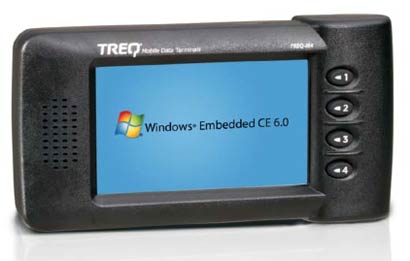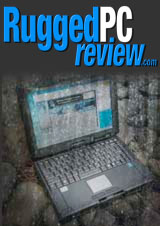Many mobile applications require a small, rugged vehicle-mount computer for a variety of simple data lookup, data entry, fare collection, and other custom applications. Such computer must be simple to use and operate, ultra-reliable, and small enough to never get in the way. The QSI TREQ-M4 mobile data terminal was designed for just those tasks.

The TREQ-M4 measures just 6.6 x 3.6 x 1.5 inches and weighs just over a pound in a typical configuration. This is a tough tool for vehicle-based jobs, with a fairly large 4.3-inch touchscreen display with wide-format 480 x 272 pixel resolution. The display is outdoor-readable with a very bright 600 nits white LED backlight. Operation is super-simple via four independantly programmable function keys.
The TREQ-M4 runs Windows Embedded CE 6.0 R2 Core or Professional on the 624MHz version of the speedy, powerful Marvell PXA300 processor. The device comes with 128MB of RAM and either 2 or 4GB of non-volatile memory. A 3-track magnetic card reader is optional. The TREQ-M4 has two USB host ports, as well as two serial ports, one of them supporting either RS232 or RS422. An optional third port can either be for LAN or a third USB port. This being a vehicle-based terminal there is no battery; instead, the TREQ-M4 uses 6 to 32 Volt DC vehicle power.
QSI designed the TREQ-M4 so it is able to handle the type of handling and environmental conditions encountered in years of vehicle use. The device is rugged, with the housing made of a blended polycarbonate and polyester resin. It can operate within a very wide temperature range from -4 to 158 degrees Fahrenheit, which is probably more than a driver can handle. It is virtually immune to shock and vibration as well.
Wireless connectivity is limited to optional Bluetooth 2.0 and there are no expansion card slots. Since the device is so small, it can be mounted practically anywhere. The housing includes two 13mm mounting studs with RAM Mount B-238 spacing (see listing of RAM B-38 mounting hardware).
Salt Lake City, Utah based QSI Corporation began operations in 1983 as a manufacturer of low-power bus board computers. It was acquired in 2010 by Swedish Beijer Electronics and now designs and manufactures operator interface terminals for industrial, commercial and vehicle applications as Beijer's North American subsidiary.



